Tribeca 2020: Animated Shorts Curated By Whoopi Goldberg
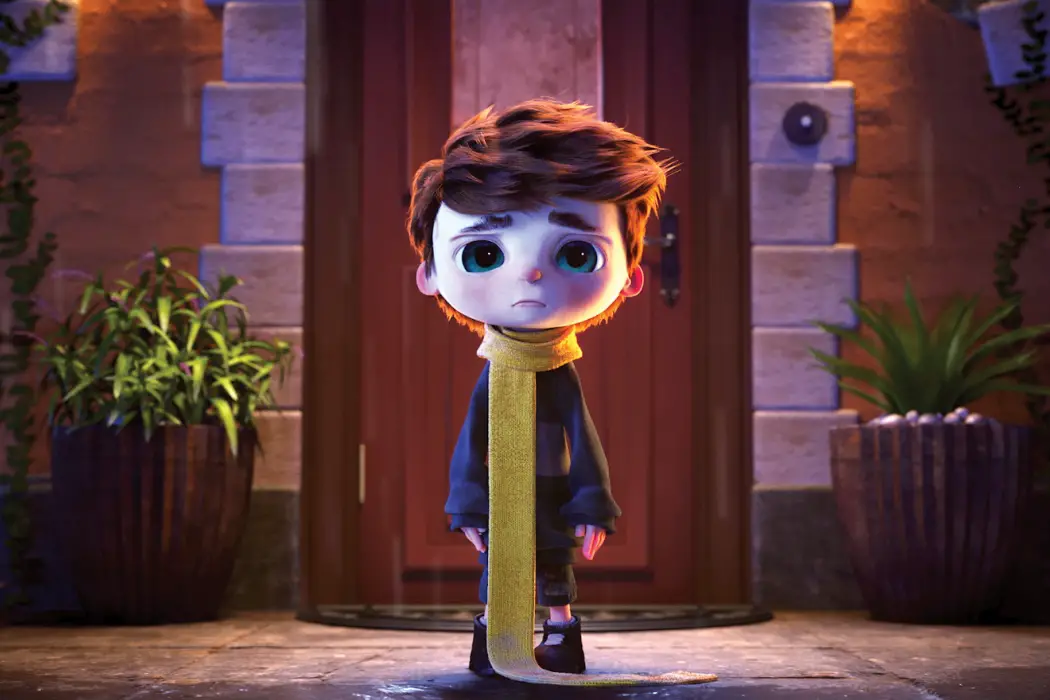
Stephanie Archer is 39 year old film fanatic living in…
Every year, the animated shorts at the Tribeca Film Festival are a staple and a must-see experience. With the postponement of the festival this year due to the global pandemic, I found a sadness that at, least for now, the animated shorts showcase would be put on pause.
Yet, as we all must evolve during this time, so too did Tribeca to meet the challenge. Releasing a plethora of there intended festival content online, Tribeca has lived up to the classic Hollywood mantra – “The show must go on”.
Bathwell in Clerkentime (Alex Budovsky)

Returning to the Tribeca Film Festival is director Alex Budovsky, whose animated short Brooklyn Breeze entertained audiences alike back in 2018 with its skillfully crafted animation surrounding the beat of not only the city, but the score from composer Stephen Coates. Bathwell in Clerkentime follows a similar structure of hypnotic animation accompanied by Coates’ score once again.
Utilizing silhouetted animation, Budovsky is able to once again a create crisp series of images that flow together to tell the story of the two cuckoos (who were previously seen in his short Bathtime in Clerkenwell) as they continue through their daily life. As life keeps cranking on, so too does the nagging, the drinks with friends and the growth of a family. There is a rhythm created not only by the speed of the animation, nor strictly the score, but rather an understanding of what is being depicted on screen. Moments we have undoubtedly shared similar to the cuckoos – even overwhelmingly at times.
There is a tension that at any moment, either of these characters could blow, their lives overflowing from the chaos and unrelenting pace of time. Yet, they ride the rollercoaster of life together and to the end. This was one of my favorites of this year’s showcase, and I continue to look forward to what Budovsky will bring us next.
Beyond Noh (Patrick Smith)
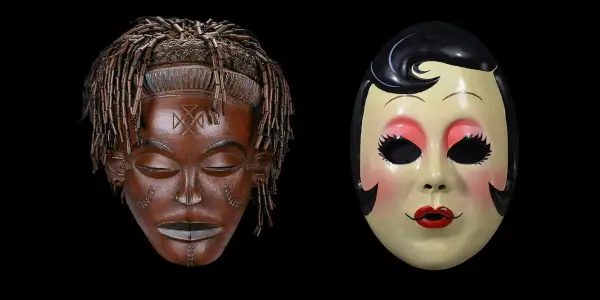
Sometimes the best things do come in the smallest packages. Nothing could be truer than Patrick Smith‘s animated short Beyond Noh. Animated utilizing 3,475 masks from across the world and time, Smith is able to capture the history of not only a culture but the evolution of man. Beyond Noh is one of the most fascinating and hypnotizing shorts of the segment and deserves every ounce of praise is destined to receive.
Initiating the sequence with masks of the Japanese Noh theater, Smith takes viewers on a journey through ritual, history, politics and entertainment, all kept to the pace of a simple drum. What viewers will come to understand is that every culture has a mask, has a facial composite that captures a time and place. While it was fascinating to see the masks of history, it is the more modern ones that spark a new understanding. I personally had failed to realize until now how culturalized masks are, what a stamp of time they truly impress.
As masks of V for Vendetta, the Joker and the US presidents (just to name a few) flashed by, each with their own modifications, you realize how deeply ingrained in society masks have always been and still are. It is through this realization that Beyond Noh transcends just a simple showcase, but rather opens up a conversation regarding culture, history and the passing of time. If you have the opportunity to see this short, make it a must. You won’t regret it.
Friends (Florian Grolig)

Director Florian Grolig‘s Friends, winner for Best Animated Short for this year’s Tribeca Film Festival, is a monochromatic animated short that looks at the struggles and triumphs of friendship. The depths of loyalty and betrayal find their personification here through the unusual friendship between a giant and a young boy.
With its vibrance, sketch-esque animation, and story resonating that of Shel Silverstein and Gulliver’s Travels, Friends forces viewers to examine the effects of toxic relationships, herd immunity and loyalty. While the young boy is initially excited to show his family and town his new friend, disaster strikes as the town is ill-equipped to welcome the giant, his arrival leaving devastation in its wake. While the boy begins to question their unlikely friendship, his feelings of uncertainty are driven deeper as he watches those around him fall victim to the giant’s swift and merciless means to keep him safe.
In a moment of weakness, as the town surrounds the sleeping giant (cloaked in what resembles the hoods of the Klu Klux Clan), the young boy is influenced by the herd, giving into hate of the unknown and that which can’t be controlled. While guilt and regret instantly follow, the damage has already been done, trust broken. Drowning in the grief he has caused his friend, the young boy cries, his rejection reflected back to him by the giant. Yet, where he floundered in his loyalty, the giant proves that true friendship, however tested, runs deep.
Friends delivers in all areas, keeping its somewhat heavy-handed topics afloat with a clever craft in animation and humor in the delivery. It is instantly clear why Friends won the hearts of the Tribeca Film jury, and it is sure to win yours.
Grandad Was A Romantic (Maryam Mohajer)
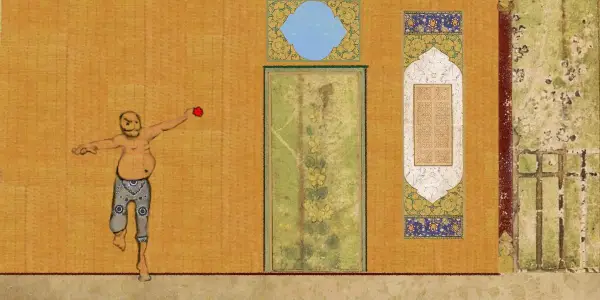
There is a surreal feeling you get watching Maryam Mohajer‘s animated short Grandad Was A Romantic. The wispy animation exudes the sense of romanticism and mystery. Its vibrant color giving way to happiness, excitement, and recollection as the narrator speaks of their grandad’s courtship of their grandmother and the subsequent marriage that would follow.
Having seen grandmother only once, grandad set off to find her and ask for her hand in marriage. A wedding followed, attended by many, each giving way to dancing and merriment. As the excitement began to mellow out, grandmother and grandad began to start a family, bringing two girls and boy into the world. The entire time, grandad telling grandmother she was the love of his life.
That is until another woman claimed his affections. And another. And another. Where the short starts of as a fairy tale of love at first sight and evolves into family, grandad proves himself to be, as some would say, a romantic. Grandmother, however, has more colorful words to say on the matter.
Kapaemahu (Dean Hamer, Joe Wilson and Hinaleimoana Wong-Kalu)
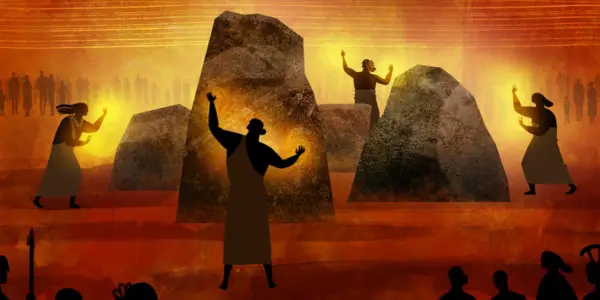
Receiving a special jury mention at this year’s Tribeca Film Festival, Kapaemahu is the latest film to highlight the culture and history of the Pacific. Much like Moana before, Kapaemahu brings to light a lost and forgotten story of a people who were bestowed a true gift that has become mostly lost with time. With Kapaemahu, the history finds a new audience and a new light.
According to legend, four mahu (third-gender individuals) traveled to Hawaii from Tahiti, bringing healing powers to the people on Waikiki Beach. As their healing powers transformed a community, the people of Waikiki did not want the mahu to leave them. During a ritual, the mahu embed their powers into four stones on the beach, disappearing after the transfer was complete. For centuries after, the stones were regarded as sacred, many leaving gifts of thanks and appreciation. Though as with many things throughout history, the stones became lost to time. There legend lost to the ears of those who might listen.
With the arrival of the missionaries, the sacred stones become merely that – stones. As cities arose around them, the stones sunk away until they were finally removed from the sand in 1997 and placed on platform for perseverance. While the legend may be just that, the mahu powers within wait patiently for those who may be enlightened – for those who may see the healing powers they represent and contain.
Kapaemahu is a fascinating short film, one that I desired more information about at its conclusion. This is no Moana, but rather its own doctrine into cinema, a medium that is truly starting to tell the stories of the world for the masses.
The Tiger Who Came to Tea (Robin Shaw)
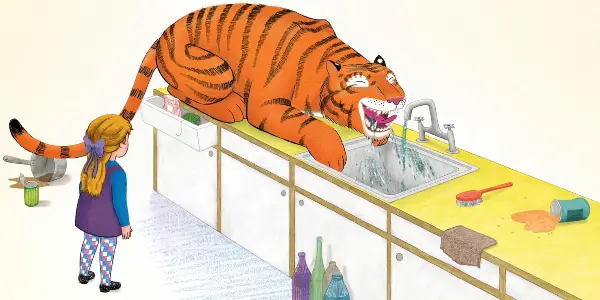
Within an animated short film showcase, wherein many of the shorts run under ten minutes, The Tiger Who Came to Tea was the longest of the set checking in at 24 minutes. From Universal Studios, The Tiger Who Came to Tea is adapted from the children’s book by Judith Kerr, whom the film is dedicated to, of the same name and follows the most unusual afternoon when a failed trip to the park turns into one of the most interesting tea parties to date.
The Tiger Who Came to Tea is literally a children’s book come to life, the hand drawings rendered in mirror animation – it was almost as though I was being read the story itself. As an afternoon to the park has been canceled due to unexpected weather, a mother and her daughter decide to embark on making a plethora of confections. From cupcakes to sandwiches to the perfect cake for father, their cooking lends itself to the perfect occasion to have a tea party. As they prepare to indulge in the day’s creations, a knock at the door welcomes a tiger into their home – a tiger whose appetite wipes out not only what they have made but everything in the house – including father’s beer!
The first half of the short is deeply engaging and perfectly crafted to entertain younger viewers. By the time we reach the Tiger Song, however, the short had begun to wear its welcome (much like the tiger). While I had known the length of the short going in, it felt as if it would not end. I can see this being a perfect encapsulation for a younger audience, however, especially in comparison to what else had been seen thus far, The Tiger Who Came to Tea was more than I had bargained for. Just when you thought it was concluding, there was always more.
Brought to life by crisp animation and the all-star voice cast including Benedict Cumberbatch, David Oyelowo and David Walliams, The Tiger Who Came to Tea will satisfy viewers of the children’s book and younger audiences, yet for many, this will overstay its welcome.
Umbrella (Mario Pece)
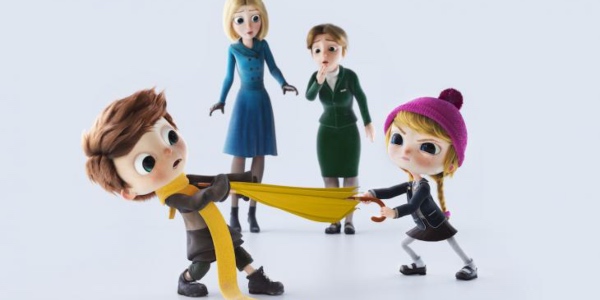
Personally, Umbrella, from director Mario Pece, was my favorite animated short from this year’s showcase. There is a catharsis to be had when watching, as well as a conversation to be started. Where empathy is the theme on the surface, political undertones and human rights issues lurk just beneath the surface. There is much to unpack when watching and discussing Umbrella, one I can see resonating for some time.
As a means to help those less fortunate, and as a lesson to her younger daughter, a mother and daughter arrive at a local orphanage to drop off gently used toys. While the daughter is far from happy with the idea in the beginning, seeing the faces of the orphans opening the box and engaging with the items warms her heart and brings a smile to her face. Though the feeling is short-lived as she discovers her mother’s yellow umbrella missing. Following a water-soaked trail to the attic, she discovers young Joseph hiding the umbrella in a bureau. Confronting him, her insistence on retrieving the item for her mother unearths a heartbreaking truth about Joesph’s past.
As the items pour out of the bureau, viewers join the young girl and her mother as they learn, through hand-drawn images, that Joseph and his father were refugees. Struggling on the street, they had each other but little chance for the future. Realizing he could not provide for his son as he had hoped in finding refuge, Joseph’s father leaves him at the orphanage in hopes that they can provide the safety, shelter and future for his son that he can not. Leaving Joseph with the yellow scarf he was wearing to keep his memory alive, Jospeh’s father walks away into the night, into the rain with only a yellow umbrella to protect him.
In the realization, empathy takes over the young girl, this moment in her life-transforming her perspective and future forever. Umbrella asks viewers to hesitate from forming judgments, from making permanent conclusions regarding a situation – regarding a person. For many, there is a story behind them and their actions.
Inspired by true events, Umbrella gives one of the purest examples of empathy and its power to transform the lives of those around us – and even our own lives. It also gives a brief and powerful view into the struggles and hardships refugees face for the sake of their families and where our political boundaries can affect the lives of so many.
Does content like this matter to you?
Become a Member and support film journalism. Unlock access to all of Film Inquiry`s great articles. Join a community of like-minded readers who are passionate about cinema - get access to our private members Network, give back to independent filmmakers, and more.













